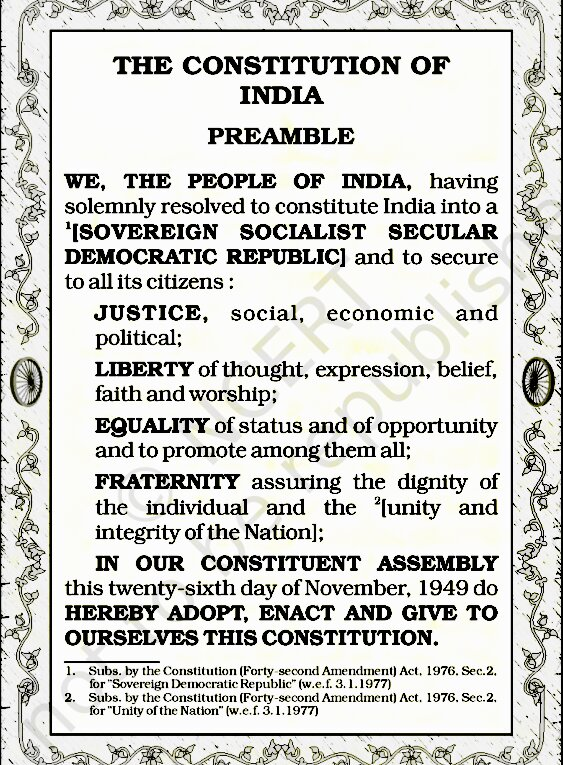Important Facts For Prelims
SC Questions Amendment of Preamble
- 13 Feb 2024
- 6 min read
Why in News?
Recently, a Supreme Court bench while hearing a petition seeking to delete the words ‘socialist’ and ‘secular’ from the Preamble, asked if the Preamble of the Constitution could have been amended without changing the date of its adoption on November 26, 1949.
- The Preamble was amended only once in 1976 to introduce the words ‘socialist’ and ‘secular’ through 42nd Constitutional Amendment Act.
What is the Preamble to the Indian Constitution?
- About:
- A preamble is an introductory statement in a document that explains the document’s philosophy and objectives.
- It was inspired by the Preamble of the Constitution of the USA.
- In a Constitution, it presents the intention of its framers, the history behind its creation, and the core values and principles of the nation.
- The ideals behind the Preamble to India’s Constitution were laid down by Jawaharlal Nehru’s Objectives Resolution, adopted by the Constituent Assembly on January 22, 1947.
- N A Palkhivala, an eminent jurist and constitutional expert, called the Preamble as the 'identity card of the Constitution.’
- A preamble is an introductory statement in a document that explains the document’s philosophy and objectives.
- Components:
- It is indicated by the Preamble that the source of authority of the Constitution lies with the people of India.
- Preamble declares India to be a sovereign, socialist, secular and democratic republic.
- The objectives stated by the Preamble are to secure justice, liberty, equality to all citizens and promote fraternity to maintain unity and integrity of the nation.
- The date is mentioned in the preamble when it was adopted i.e. November 26, 1949.
- Status and Amendability:
- Berubari Union Case, 1960: Through the Berubari case, the Court stated that ‘Preamble is the key to open the mind of the makers’ but it can not be considered as part of the Constitution. Therefore it is not enforceable in a court of law.
- Kesavananda Bharati vs State of Kerala Case, 1973: In this case, for the first time, a bench of 13 judges was assembled to hear a writ petition. The Court held that:
- The Preamble of the Constitution will now be considered as part of the Constitution.
- It held that the Preamble could be amended under Article 368, subject to the condition that no amendment is done to the ‘basic structure’ of the Constitution.
- Consequently the Preamble was amended by the 42nd Amendment Act, 1976 and the terms ‘Socialist’, ‘Secular’, and ‘Integrity’ were added to the preamble.
- ‘Socialist’ and ‘Secular’ were added between ‘Sovereign’ and ‘Democratic’.
- ‘Unity of the Nation’ was changed to ‘Unity and Integrity of the Nation’.
- Consequently the Preamble was amended by the 42nd Amendment Act, 1976 and the terms ‘Socialist’, ‘Secular’, and ‘Integrity’ were added to the preamble.
- Furthermore the court held that the Preamble is not the supreme power or source of any restriction or prohibition but it plays an important role in the interpretation of statutes and provisions of the Constitution.
- S R Bommai vs Union of India Case, 1994: The Supreme Court again held that the Preamble is an integral part of the Constitution.
UPSC Civil Services Examination Previous Year Questions (PYQ)
Prelims:
Q. What was the exact constitutional status of India on 26th January, 1950? (2021)
(a) A Democratic Republic
(b) A Sovereign Democratic Republic
(c) A Sovereign Secular Democratic Republic
(d) A Sovereign Socialist Secular Democratic Republic
Ans: (b)
Q2. The Preamble to the Constitution of India is (2020)
(a) a part of the Constitution but has no legal effect
(b) not a part of the Constitution and has no legal effect either
(c) a part of the Constitution and has the same legal effect as any other part
(d) a part of the Constitution but has no legal effect independently of other parts
Ans: (d)
Q3. The mind of the makers of the Constitution of India is reflected in which of the following? (2017)
(a) The Preamble
(b) The Fundamental Rights
(c) The Directive Principles of State Policy
(d) The Fundamental Duties
Ans: (a)
Q4. Which one of the following objectives is not embodied in the Preamble to the Constitution of India? (2017)
(a) Liberty of thought
(b) Economic liberty
(c) Liberty of expression
(d) Liberty of belief
Ans: (b)
Mains:
Q. Discuss each adjective attached to the word ‘Republic’ in the ‘Preamble’. Are they defendable in the present circumstances? (2016)







